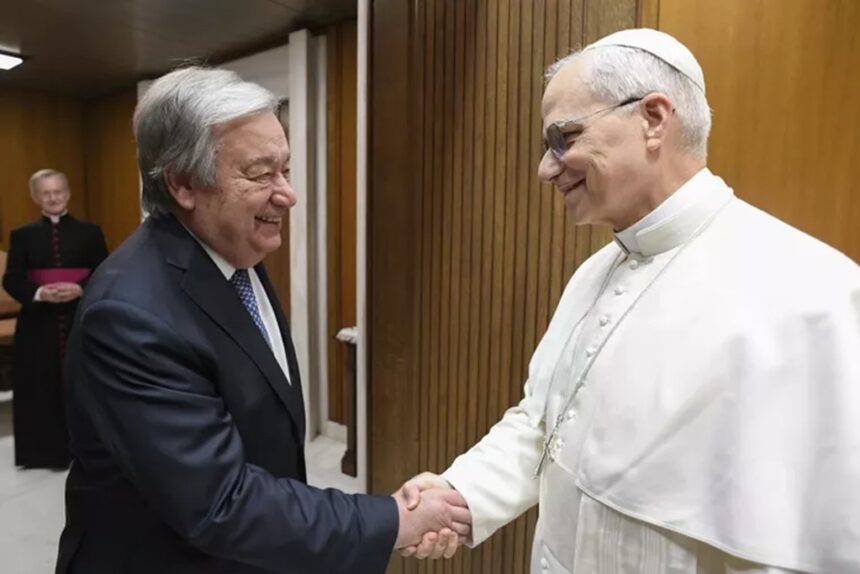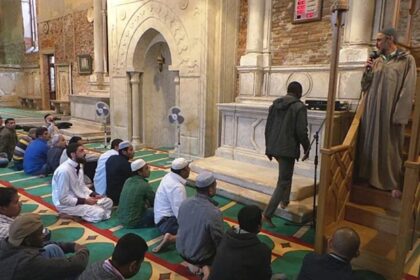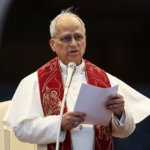VATICAN CITY– Pope Leo XIV welcomed United Nations Secretary-General António Guterres to the Vatican on June 11, 2025, for a private meeting in the Paul VI Audience Hall. This encounter marked a notable moment in the relationship between the Catholic Church and the UN, highlighting the Vatican’s active role in global affairs.
The meeting took place ahead of the Pope’s general audience in St. Peter’s Square and showed the Holy See’s dedication to working with international partners to tackle urgent world issues. Guterres congratulated Pope Leo XIV on his election, offering his support and wishing him success as pontiff. Both leaders made it clear they valued peace and human dignity.
The conversation, described as warm and respectful, focused on the pursuit of peace. While the Vatican did not share details from the Pope’s private talk with Guterres, later meetings with Cardinal Pietro Parolin, the Vatican Secretary of State, and Archbishop Paul Richard Gallagher, the Foreign Minister, shed more light. These follow-up talks confirmed the Vatican’s backing for the UN’s peace efforts.
Vatican’s role as a Permanent Observer
They talked about current UN projects, upcoming international meetings, and the ongoing challenges facing the organization. Specific conflict zones and areas of instability came up, though the Vatican did not make those details public, showing the sensitive nature of the discussions.
This meeting happened at a time when some UN policies clash with Church teachings. Issues like promoting abortion under “sexual and reproductive health,” support for gender ideology, and some parts of the 2030 Agenda often go against Catholic beliefs.
The Church holds firm on the values of life, family, and human nature, which sometimes leads to friction with UN initiatives. Cardinal Parolin, for example, has spoken against the UN General Assembly’s push for abortion and gender-related policies, stressing the need to defend human dignity.
The Vatican’s role as a Permanent Observer at the UN, a position held since 1964, gives it a voice in debates without voting rights. Archbishop Gabriele Caccia, the current Permanent Observer, represents the Holy See in these talks, promoting Catholic values like peace, social justice, and care for the vulnerable.
While this status allows the Vatican to offer its views and influence the conversation on global issues, it limits its direct impact on UN decisions, especially on controversial topics that run counter to Church teaching.
Pope Leo XIV is the first American-born pope, with both U.S. and Peruvian citizenship and a background as a missionary in Peru. His unique experience helps him connect with many groups around the world.
Guterres praised the Vatican
His election in May 2025 was met with hope from both conservative and progressive voices within the Church, as many see him as someone who can bring people together.
He puts a strong focus on dialogue, peace, and respect for every person, which lines up well with many UN goals. At the same time, he stays committed to protecting the faith’s long-held beliefs.
By meeting with Guterres, Pope Leo shows a wish to build on the work of Pope Francis, who was well known for speaking out on peace and social justice. Guterres has praised the Vatican for its strong moral leadership on issues like poverty, inequality, and climate action.
Still, the firm stance taken by the Church on certain UN policies shows the ongoing challenge of working together without giving up core values. As Pope Leo leads the Church forward, his talks with global leaders like Guterres will shape how the Vatican responds to worldwide problems and holds to its mission.
In a world often divided by conflict, the relationship between the Vatican and the UN is an important way to promote peace. While disagreements remain, both sides share a belief in the dignity of every person and the need for stability. Pope Leo XIV’s approach, grounded in both tradition and open conversation, keeps the Holy See involved in shaping global conversations about humanity’s biggest challenges.







